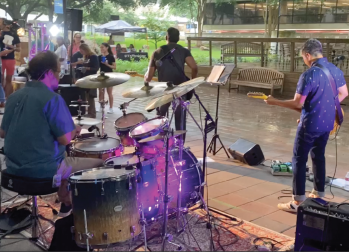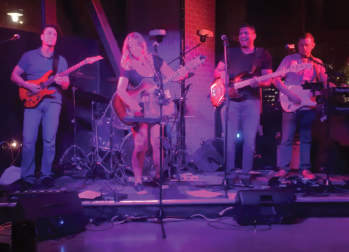
Dr. Roy believes that music requires the same rapport-building skills as having a conversation with a new patient.
“There’s no easier way to build rapport than when you play music,” he said. “It’s just so similar to moments when you have to engage a stranger in your office. You have to do the same thing on stage—make someone feel welcome and warm. Being able to do that has really helped me in both arenas. When you’re onstage, you have to connect with people using nonverbal communication and body language. It’s the same when you’re giving a scientific talk,” he said.
Explore This Issue
February 2010, February 2022After graduating from medical school in 1995, Dr. Roy became a resident in the department of otolaryngology at the University of Miami and, after completing his fellowship training in 2002, joined a heavy metal band, which got a lot of local recognition. “We did some touring, and I had an opportunity to audition for a big-name rock band,” he said. At the same time, his metal band wanted to move forward with their music ambitions, but Dr. Roy chose instead to focus on his medical career. “I had just become an attending physician three months before,” he said. While the person who ultimately won the spot with that big-name rock band won a Grammy Award, Dr. Roy said his focus on medicine as a career is the right choice for him. “My role as a physician is a huge part of who I am, though my role as a musician is the same,” he said.
Playing with the Band
Since he arrived in Houston in 2008, Dr. Roy has played the bass guitar, played keyboards, and sung backup vocals in a 1980s and 1990s cover band called Stereomaze. They play gigs in area bars and clubs, feeding off the crowd’s energy when determining their set list.

Music has played a prominent part in Dr. Roy’s life since childhood.
“We have a great time,” Dr. Roy said. “When I play with a band, I don’t play with other doctors. I’m trying to do something therapeutic for myself and put away my stressful day job. My bandmates work in the oil and tech industries and in operations, and not one of them ever says to me, ‘What happened at work today?’ All they say is, ‘Are you ready to go? Ready to play?’ I can just be myself.”
Pre-pandemic, Dr. Roy and his band played five to six times a month; gigs included setting up to play, performing, then breaking down their set, typically playing from 9:30 p.m. to 1:30 a.m. With the pandemic, Stereomaze now plays one to two times a month. “On a Saturday night, I can go out to a fun bar, hang with my amazing friends in the band, and I get to have drinks and hear music I like. Instead of being a passive participant, we’re playing songs we picked.”
A recent set list featured INXS’s “Don’t Change,” The Knack’s “My Sharona,” The Killers’ “Mr. Brightside,” and Journey’s “Don’t Stop Believin’,” with some Luke Bryan, Garth Brooks, and Johnny Cash tunes thrown in for the locals. “Living in Texas, you learn to play country songs because people go nuts,” he said. “The crowds get up and start dancing. I don’t particularly like it, but nobody is out there saying, ‘Oh, the bass player missed a note.’”
There have been several times when the parents of Dr. Roy’s patients have been in the audience when he plays. “Houston is a big city with a small town feel,” he explains. “People will eyeball me strangely and ask, ‘Are you Dr. Roy?’ By that point, I’m usually five vodkas in and I’ll answer, ‘No; I get that a lot. But that guy must be really handsome.’”
Another time, when playing with a different band at a St. Patrick’s Day late afternoon show, Dr. Roy said the chief operations officer of the hospital where he worked was at the bar while he was setting up with the band. “He walked up to me, and I said, ‘Dude, I won’t tell if you won’t.’”
I saw incredible personalities in otolaryngology—people were wonderfully warm and welcoming. —Soham Roy, MD, MMM
Finding Passion Beyond Medicine
Dr. Roy urges physicians or others who think about picking up an instrument or any other hobby that’s been neglected or long-buried to just get started.
“It’s never too late to find a passion that you always wanted to try, even if you aren’t doing it now,” he said. Despite being an accomplished musician, Dr. Roy had never played drums until Lee Smith, MD, a former resident of his and now chief of pediatric otolaryngology at Cohen Children’s Medical Center in New York City, urged him to do so at an otolaryngology meeting in Amsterdam. During the pandemic lockdown, Dr. Roy realized that, since he couldn’t operate, he had time to teach himself exactly how to play using a borrowed drum set.
“Every otolaryngologist I know has a passion outside of work, and doing it makes you a better doctor,” he said. “It’s a form of relief you can’t find anywhere else. It can be your family or church or something else.”
In addition to spending time playing music and enjoying his dogs, family, and athletic activities, Dr. Roy spends time with his 7-year-old daughter. “She doesn’t play music,” he said. “I always hoped she’d play the drums one day so I could play bass with her, or the other way around—maybe one day.”
Ultimately, Dr. Roy knows that balancing music with medicine is exactly the right thing for him. “When I’m doing the music thing, I’m only thinking about what I’m doing to be a great musician,” he said. “And when I am at work, I focus on being the best otolaryngologist I can be.”
Cheryl Alkon is a freelance medical writer based in Massachusetts.